In Ukraine, Russia’s war of aggression has upended not just borders but the country’s cultural landscape. Conversations about identity, gender, and sexuality have gained new urgency. Women are increasingly stepping into combat roles once dominated by men, while relationships can dissolve as quickly as they form. Many people now live as if there might be no tomorrow.
Ukrainian author and singer Irena Karpa has never been afraid to dive into these topics, having challenged long-standing taboos and patriarchal norms in Ukraine from the very beginning of her career. Karpa’s words cut through the sometimes stifling silence imposed by traditions, daring to speak openly of female sexuality, longing, and the quiet revolutions raging beneath the surface of a society in flux.
In an interview with the Kyiv Independent during the Book Arsenal Festival, the largest international literary event in Ukraine, Karpa reflected on the evolving roles of women in Ukrainian society and the military, the raw intensity of love and desire in times of crisis, and the emotional aftermath that will shape a new generation of Ukrainian storytellers.
This interview has been edited for length and clarity.
The Kyiv Independent: As someone who writes extensively about womanhood, how do you see gender roles in Ukraine?
Irena Karpa: When I first started writing in my early 20s, it felt really rebellious to talk openly about female sexuality, women’s choices, and subjectivity — I’m not sure if that’s the right word in English, but you know what I mean. The idea that a woman isn’t just a "nice lady," a toy in a man’s bedroom, or a decorative part of his life. For me, it was a challenge. I kept wondering: Why is it always the man who gets to choose? Even as a kid, that felt deeply unjust to me.
I grew up in the Carpathian Mountains, among the Hutsuls, and there was this awful saying: "An unbeaten woman is like a blunt tool – you can’t harvest with it." It’s horrifying, right?
I always pushed back against that mindset. I told myself no man would ever touch me against my will or hurt me, even though that kind of behavior was often normalized in the patriarchal society around me.
So my writing became a form of resistance. It was about young, brave, decisive women who wanted to make their own choices — who didn’t want to be just someone’s wife or mother or endlessly accommodating to others. Of course, that kind of writing wasn’t always well-received.
Especially because if you don’t win the so-called genetic lottery — being the stereotypical "ideal" Ukrainian woman — then it’s even harder. I didn’t fit that mold either.
So you have to find something else — you need to tap into a strong inner force to show the world who you really are. That’s why I turned to alternative music. I couldn’t see myself going into pop — I didn’t fit the mold.
It was the same with literature. I didn’t quite fit the typical profile there either. There weren’t many women writing in the way I wanted to write. Probably the most prominent figure (in Ukrainian literature) was [Oksana Zabuzhko](https://kyivindependent.com/oksana-zabuzhkos-the-longest-journey-an-excerpt/) — she still is. I read her work and thought, “Wow, you really can talk openly about sex.”
Of course, she used different language — more literary terms for private parts and so on — but still, it was powerful. I remember one part that really struck me: she wrote about male arousal and a woman approaching him. I must’ve been around 18 at the time when I read it, and I was stunned — not because it was the first sexual scene I’d ever read. I had read (Guy de) Maupassant, for instance, since I grew up with a lot of French literature. And in the '90s, we had this funny tabloid called “Pan plus Pani,” which was full of erotic stories.
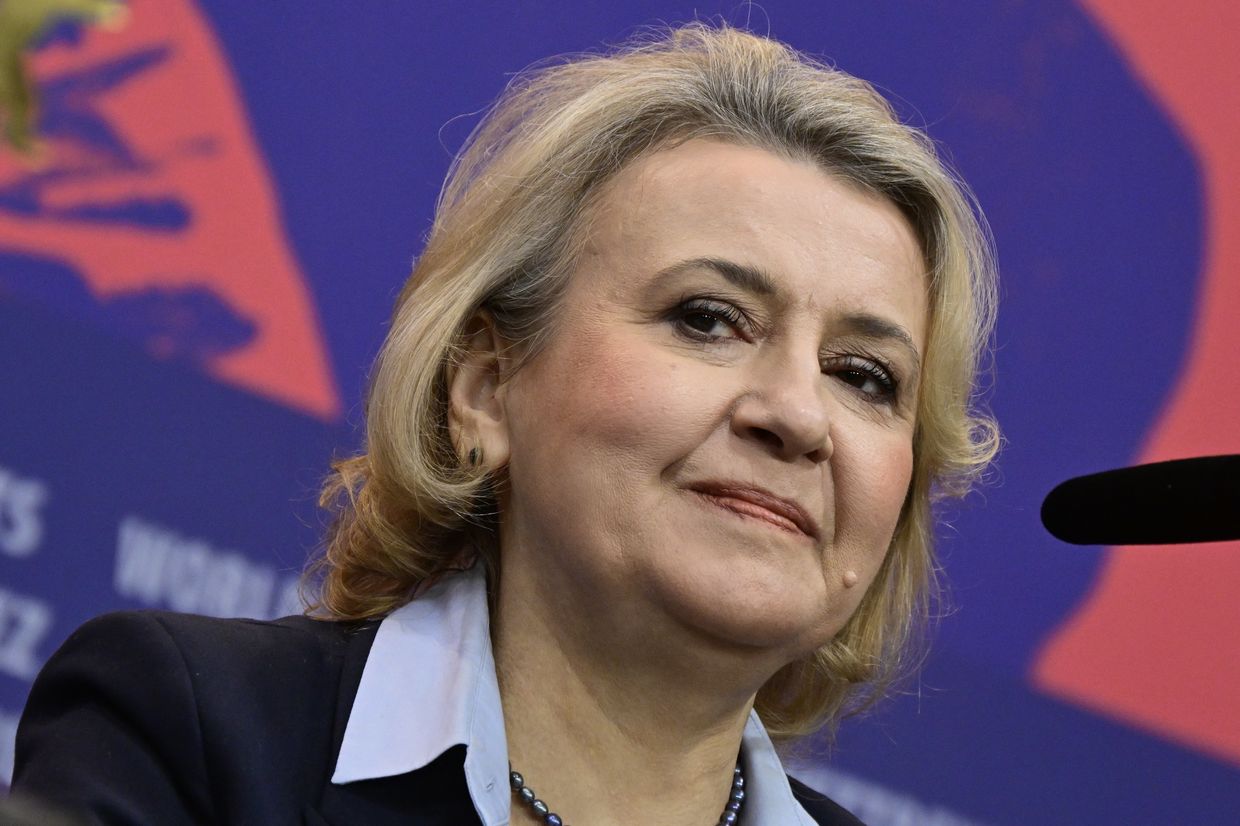 Ukrainian writer Oksana Zabuzhko attends a press conference prior to the opening of the 74th Berlinale in Berlin, Germany, on Feb. 15, 2024. (John Macdougall / AFP via Getty Images)
Ukrainian writer Oksana Zabuzhko attends a press conference prior to the opening of the 74th Berlinale in Berlin, Germany, on Feb. 15, 2024. (John Macdougall / AFP via Getty Images)
But Zabuzhko was different. She was older than my parents, and here she was, unapologetically writing about sex. I thought, “Wow, she’s a woman and she can do this?” That felt like permission — like she opened a door for the rest of us.
Then there were other writers — like Yuri Izdryk or Yuri Andrukhovych — who also wrote about the body and physical experiences, in very bold and different ways. Sure, there were patriarchal elements in some of their work, but I never felt like I had to accept "secondhand sex," you know? Just because I’m a woman doesn’t mean I’m beneath a man. Never. It always felt equal — or at least, it depended on the person. If someone’s clearly less intelligent than me, why should his opinion carry more weight just because he’s a man? No way.
The Kyiv Independent: Do you feel that the war has shifted these patriarchal ideas about gender roles?
Irena Karpa: Things are changing a lot now. In the beginning, if you listen to activists or women in the military — like Maria Berlinska — she’ll tell you how bad it was. There wasn’t even basic underwear designed for female soldiers. The uniforms didn’t fit: too tight around the chest, too loose elsewhere. There was nothing made for women — it was all designed with men in mind.
And even if a woman was trained to be a shooter, they’d still list her as a kitchen worker. It was absurd.
But now, things are shifting. The last numbers I saw said there are around 75,000 women serving in the Ukrainian army, and many of them hold commanding positions. So yes, the war is forcing these roles to evolve.
We’re seeing incredible women rise — like Natasha, the woman who made headlines for shooting down a Russian missile. Before the full-scale war, she was a kindergarten teacher. That kind of transformation is powerful.
We’re also hearing many more female voices — not just in the military but across the volunteer sector and civil society. We still don’t have enough women in politics, but there are many leading in business. Though even there, they face sexism. I have friends who head major companies, and they still get talked down to like they don’t belong.
But it is changing — and it’s changing fast.
I really hope I live to see the day when a woman becomes president of Ukraine. And in the U.S. too — we all had hopes. A woman of color in leadership should be normal by now. People need to accept that change is here. The time for sexism and racism should be over, but the fight goes on. And it will continue.
Read also: Ukrainian Valkyries: Women embrace military training to learn to defend their homeland (Photos)
The Kyiv Independent: As a storyteller, how do you see the ways in which wartime is reshaping intimacy between people?
Irena Karpa: Life speeds up — and when it does, everything within it starts moving faster too.Relationships, love stories — it’s all true. I know people who lived through three or even five love stories just during the war. And each time, it felt like: “This is the one.”
People get married quickly, and often very young, because you never know — tomorrow might not come. So why wait? Why postpone something meaningful, some experience you deeply want to live? You live fast because there's no guarantee of later.
I really hope that kind of urgency won't become the norm for the younger generation — but who knows anymore? In Ukraine today, no one is truly safe — not even in (western cities like) Lviv.
Relationships, especially in times like these, are about shared values. Not hormones. Not a piece of paper. But something deeper — something forged in the intensity of shared experience.
Back in my youth, we had the luxury of time — to fall in love slowly, to live with someone, to figure it out. Young people today don’t have that. Over three years of their lives have already been stolen by war. Before that, it was Covid.
It’s heartbreaking. They missed school, missed university. Now, they live in constant anxiety, in a permanent state of risk. So of course, they live fast. It’s not surprising they get married quickly, divorce quickly.
I’ve seen it firsthand. As a storyteller, I even wrote about one such woman in my (upcoming) book. She fled to France with her teenage daughter. From that distance, she began to see her past relationships for what they were — dead long before she left. Sometimes, distance gives you clarity.
It’s the same for a soldier. If his wife is emotionally disconnected — whether she’s in Ukraine or abroad — and there's a woman beside him, maybe a volunteer or fellow fighter, someone who shares his values in the here and now… naturally, a connection forms.
Because relationships, especially in times like these, are about shared values. Not hormones. Not a piece of paper. But something deeper — something forged in the intensity of shared experience.
It was like that during the Maidan revolution, too. So many couples got married right there, in the tents. It was romantic, yes — but also fast, impulsive, driven by adrenaline and the sense that time was running out.
War is like that, but even more intense. Because when death is near, every emotion is amplified. You feel things more deeply. Life becomes sharper, more vivid. Even the smallest decisions feel profound.
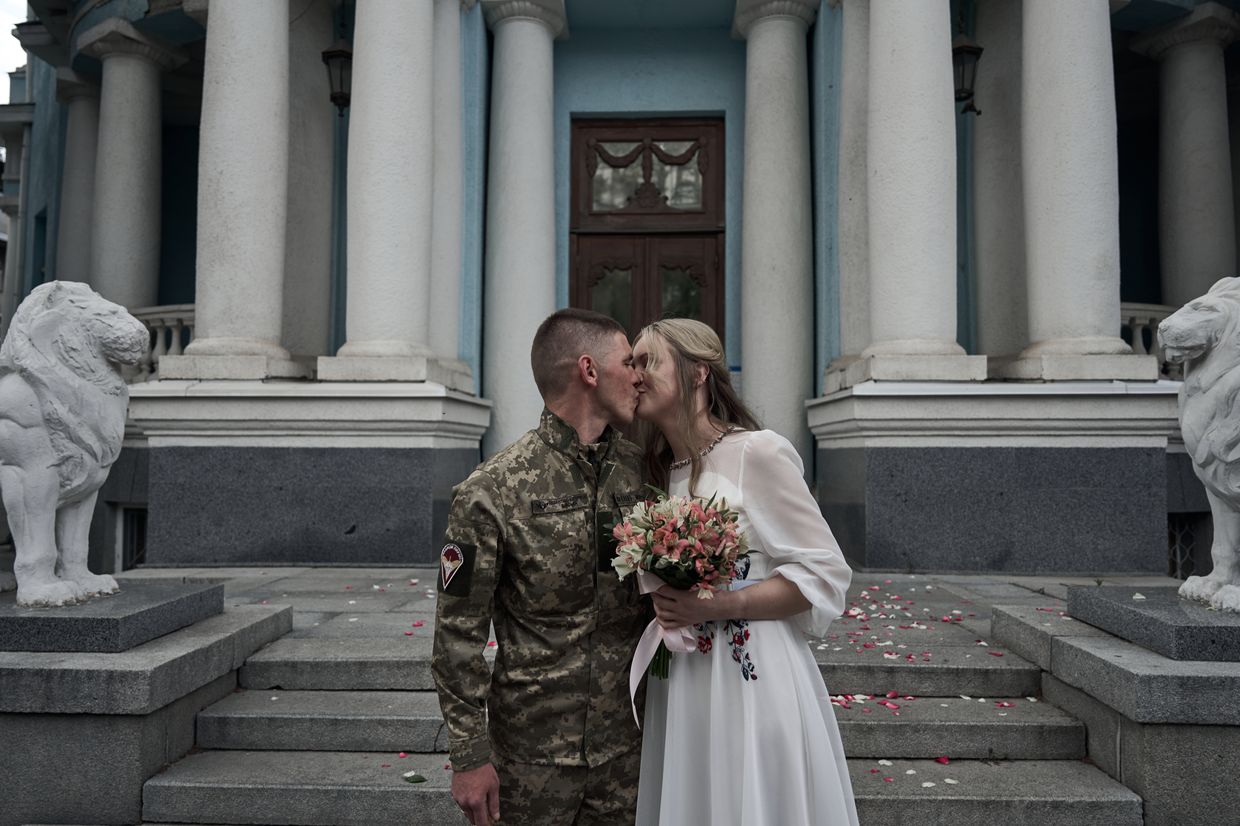 A bride and groom kiss during their wedding in Kharkiv, Ukraine, on May 18, 2024, amid the Russian invasion. (Kostiantyn Liberov / Libkos / Getty Images)
A bride and groom kiss during their wedding in Kharkiv, Ukraine, on May 18, 2024, amid the Russian invasion. (Kostiantyn Liberov / Libkos / Getty Images)
As a writer, I use those stories. I just finished writing a book called “My Boyfriend Comes Back on Sunday.” It’s dedicated to a different kind of hero — not the ones who act fast, but the ones who wait. And the ones who are waited for. The novel is about a long-term, long-distance relationship between two people who have never met — but they're in love.Imagine loving someone you may never actually see in person. And yet, people stay faithful, deeply committed to each other, even with that uncertainty. It's another way of experiencing the war — through emotion, through longing, through love that exists in absence.
I find it incredibly compelling to explore these emotional landscapes — the different kinds of relationships, the transformations of the human soul under pressure. The events of the war — the battles, the destruction — those are being documented everywhere already: in videos, in news reports, in documentaries. They don't need me for that.
As a writer, what interests me is something else entirely: the passion, the sexuality, the bonds, the commitments — how all of that shifts and evolves during wartime.
The Kyiv Independent: We're talking about how many things are changing and becoming more open — but what taboos do you think the next generation of Ukrainian authors will have to contend with?
Irena Karpa: Oh, I think there will be a kind of emotional low tide after all this. I wonder what it will look like — like post-war fashion, for example, where designers use colors to compensate for the heaviness, like Dior with their floral dresses.
There will definitely be a new subculture born from this — a fresh expression of society. I don’t know exactly what it will be yet, but, like after every war, there will be a very empty, quiet moment.
There will be grief — because right now, we don’t even allow ourselves to fully mourn those we’ve lost, our loved ones. Afterward, society will have to adjust to many people living with the physical consequences of war — those with prosthetics, new faces of a changed community.
Even our perception of sexuality and what we consider sex symbols will shift. It’s already changing right now.
Writers will need to explore all this — the loneliness many will feel, because a lot of people will be left alone.
I try to focus on brighter sides, but there will be a lot of PTSD among civilians and especially those returning from the front lines. The adrenaline, the sense of purpose, the support of true friends — all of that will be gone, making everything feel dull and gray.
I believe this moment — this aftermath — will be a rich, complex subject for many writers to explore in the years ahead.
Note from the author:
Hi there, it's Kate Tsurkan, thanks for reading my latest interview. It's really important for me to do my own small part to promote Ukrainian authors in the English-speaking world. Irena Karpa is one of my favorites because she's such a great role model for women — beautiful, strong, and fearless. If you like reading this sort of thing, please consider supporting us and becoming a member of the Kyiv Independent today.
Read also: 10 authors shaping contemporary Ukrainian literature
From The Kyiv Independent - News from Ukraine, Eastern Europe via this RSS feed
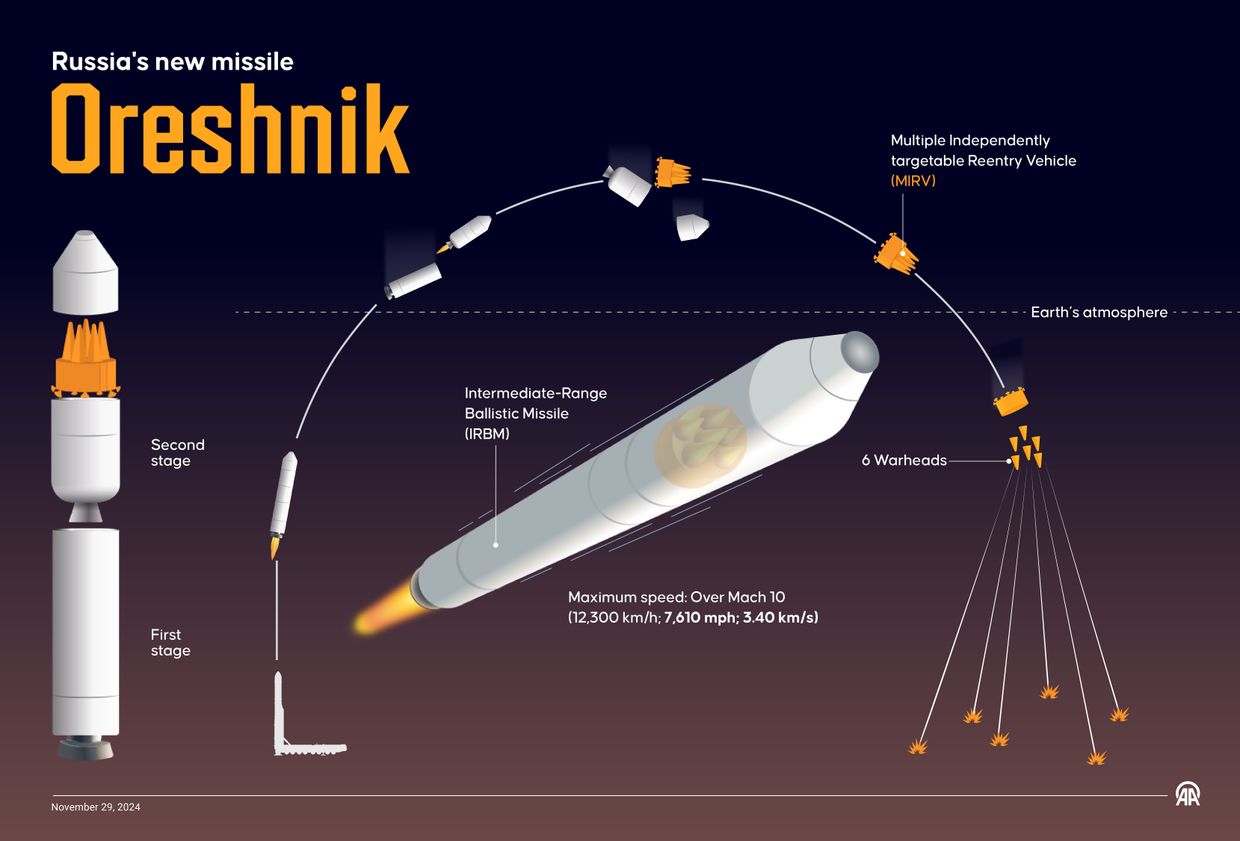 An infographic titled "Russia's new missile Orehsnik" created in Ankara, Turkiye on November 29, 2024. (Omar Zaghloul/Anadolu via Getty Images)
An infographic titled "Russia's new missile Orehsnik" created in Ankara, Turkiye on November 29, 2024. (Omar Zaghloul/Anadolu via Getty Images)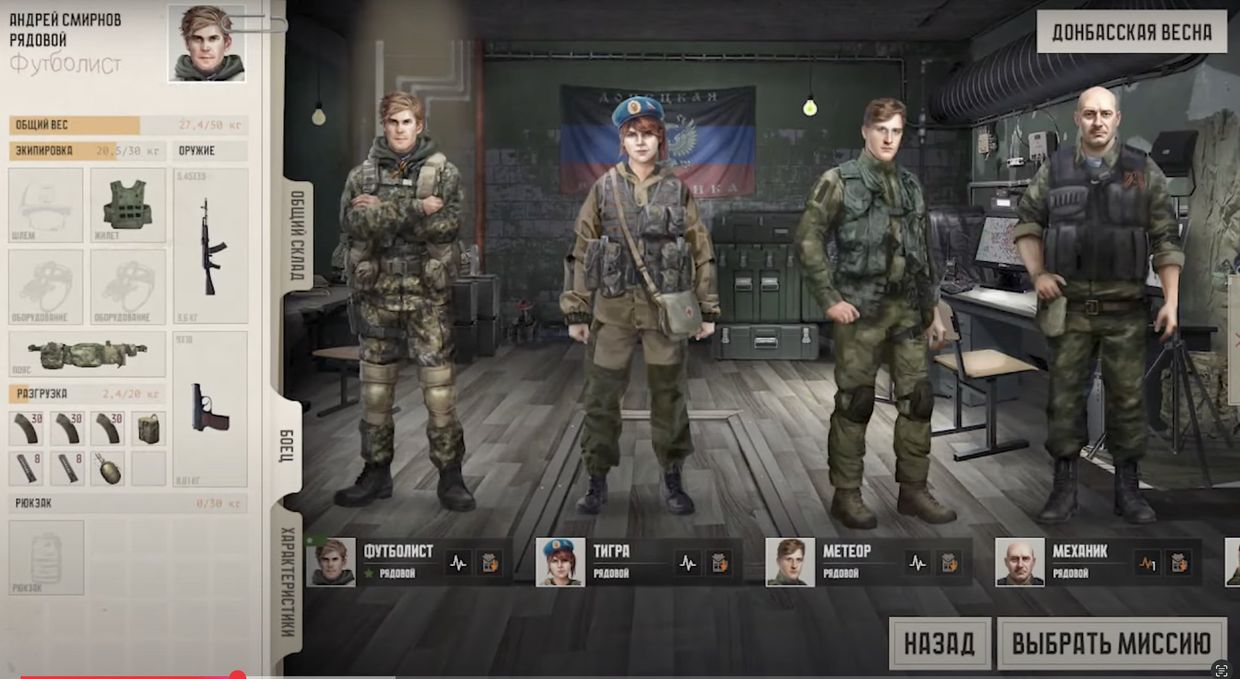 Character selection screen from Squad 22: ZOV - the game whitewashes Russian war crimes and promotes anti-Ukrainian narratives. (X)
Character selection screen from Squad 22: ZOV - the game whitewashes Russian war crimes and promotes anti-Ukrainian narratives. (X)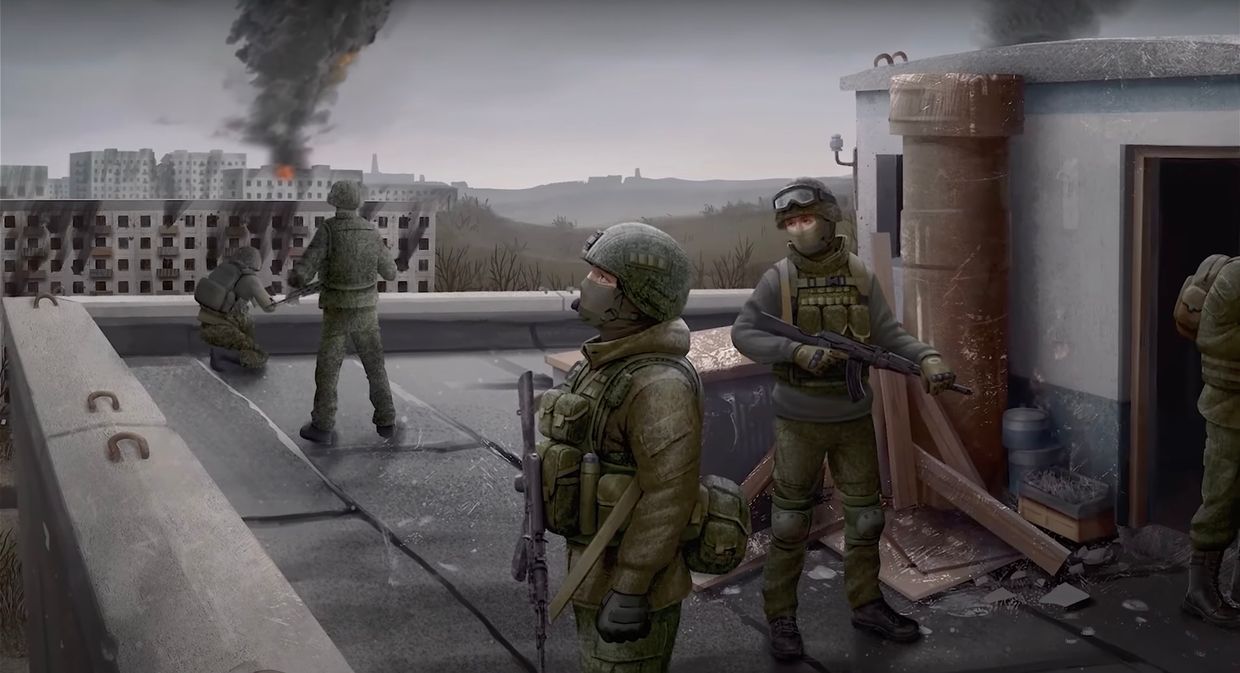 Artwork from Squad 22: ZOV depicts Russian troops overlooking a burning Ukrainian city. (X)
Artwork from Squad 22: ZOV depicts Russian troops overlooking a burning Ukrainian city. (X)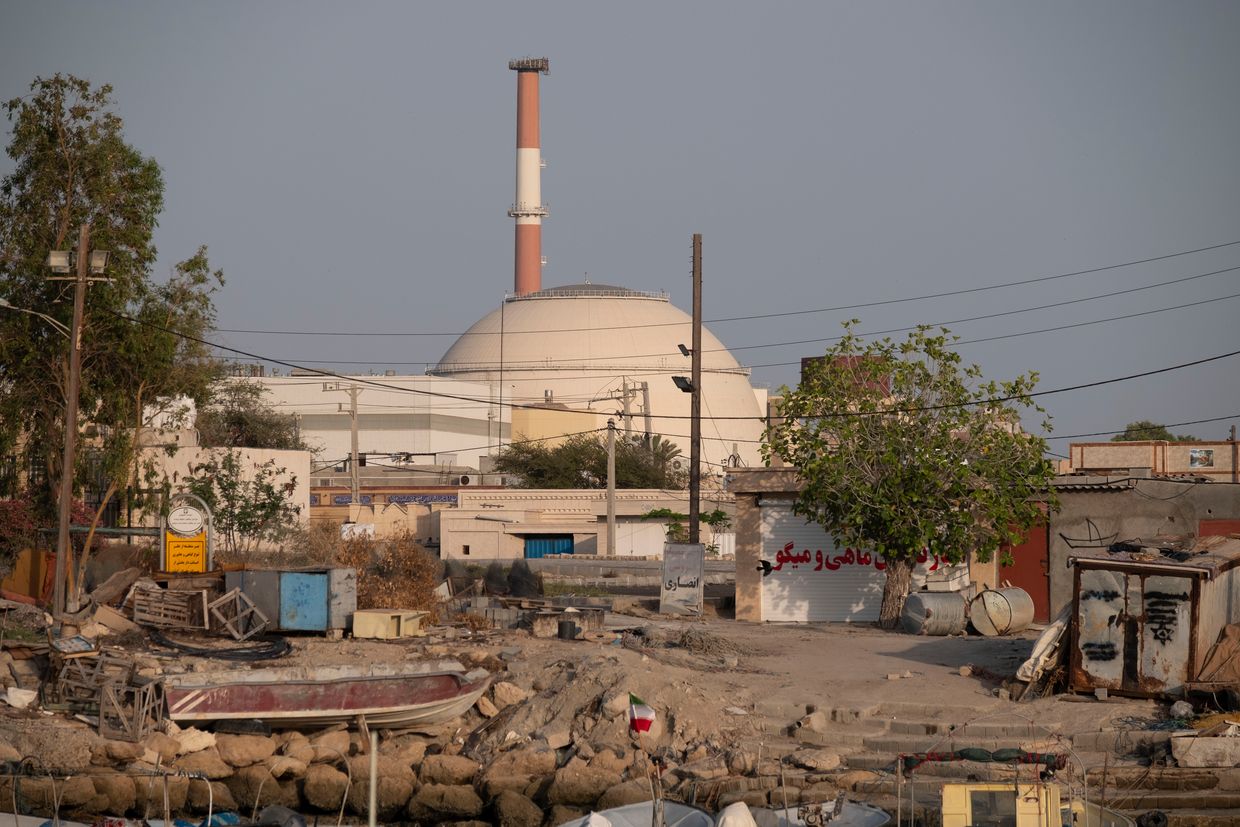 The Bushehr nuclear power plant is seen in a coastal village in Bushehr province, Iran, on April 29, 2024. (Morteza Nikoubazl / NurPhoto via Getty Images)
The Bushehr nuclear power plant is seen in a coastal village in Bushehr province, Iran, on April 29, 2024. (Morteza Nikoubazl / NurPhoto via Getty Images)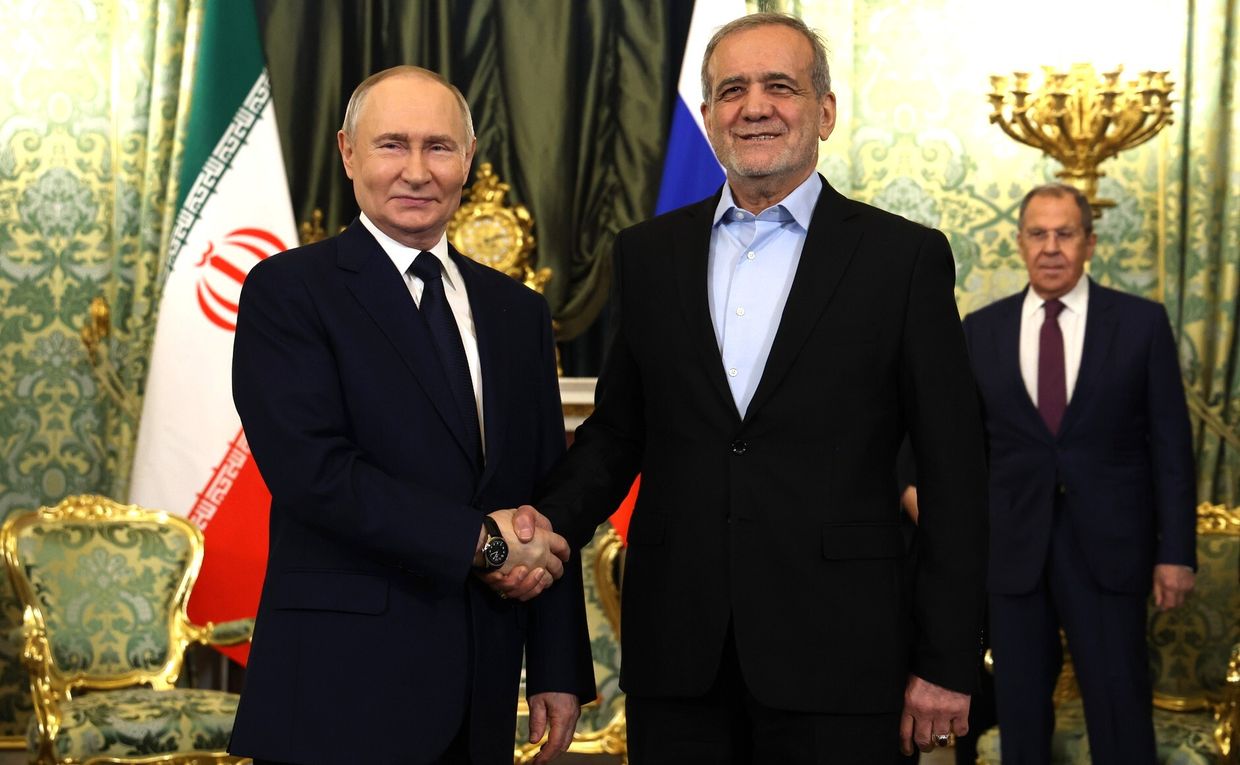 Russian President Vladimir Putin (L) meets with Iranian President Masoud Pezeshkian (R) on Jan. 17, 2025. (Kremlin Press Office / Handout / Anadolu via Getty Images)
Russian President Vladimir Putin (L) meets with Iranian President Masoud Pezeshkian (R) on Jan. 17, 2025. (Kremlin Press Office / Handout / Anadolu via Getty Images)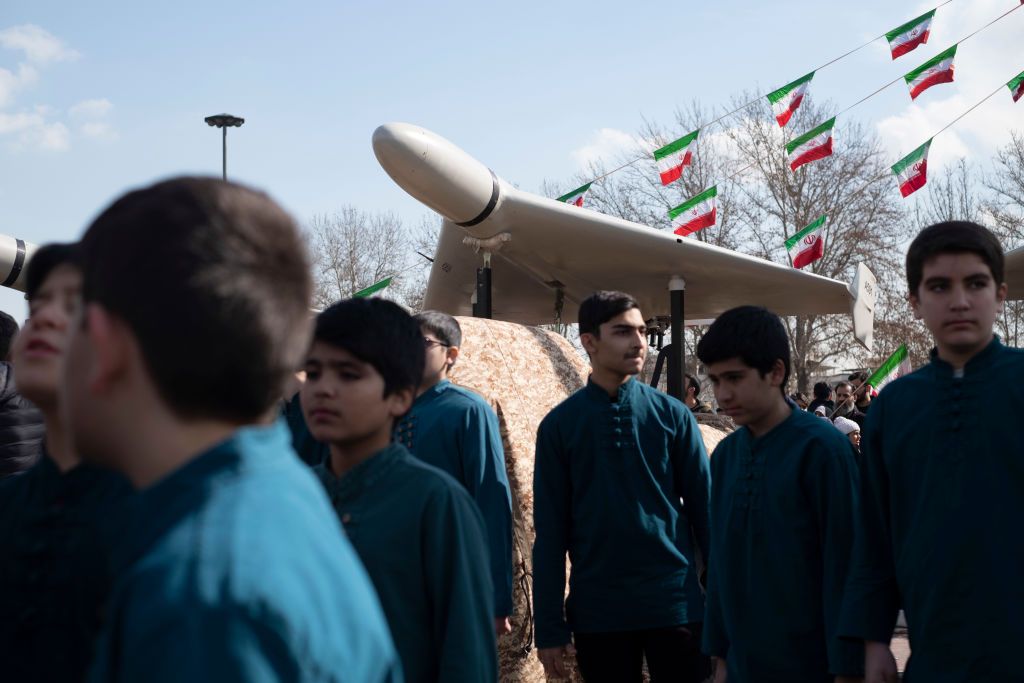 Iranian youth stand under an Iranian-made Shahed-136 unmanned aerial vehicle in Tehran, Iran, on Feb. 11, 2023. (Morteza Nikoubazl / NurPhoto / Getty Images)
Iranian youth stand under an Iranian-made Shahed-136 unmanned aerial vehicle in Tehran, Iran, on Feb. 11, 2023. (Morteza Nikoubazl / NurPhoto / Getty Images)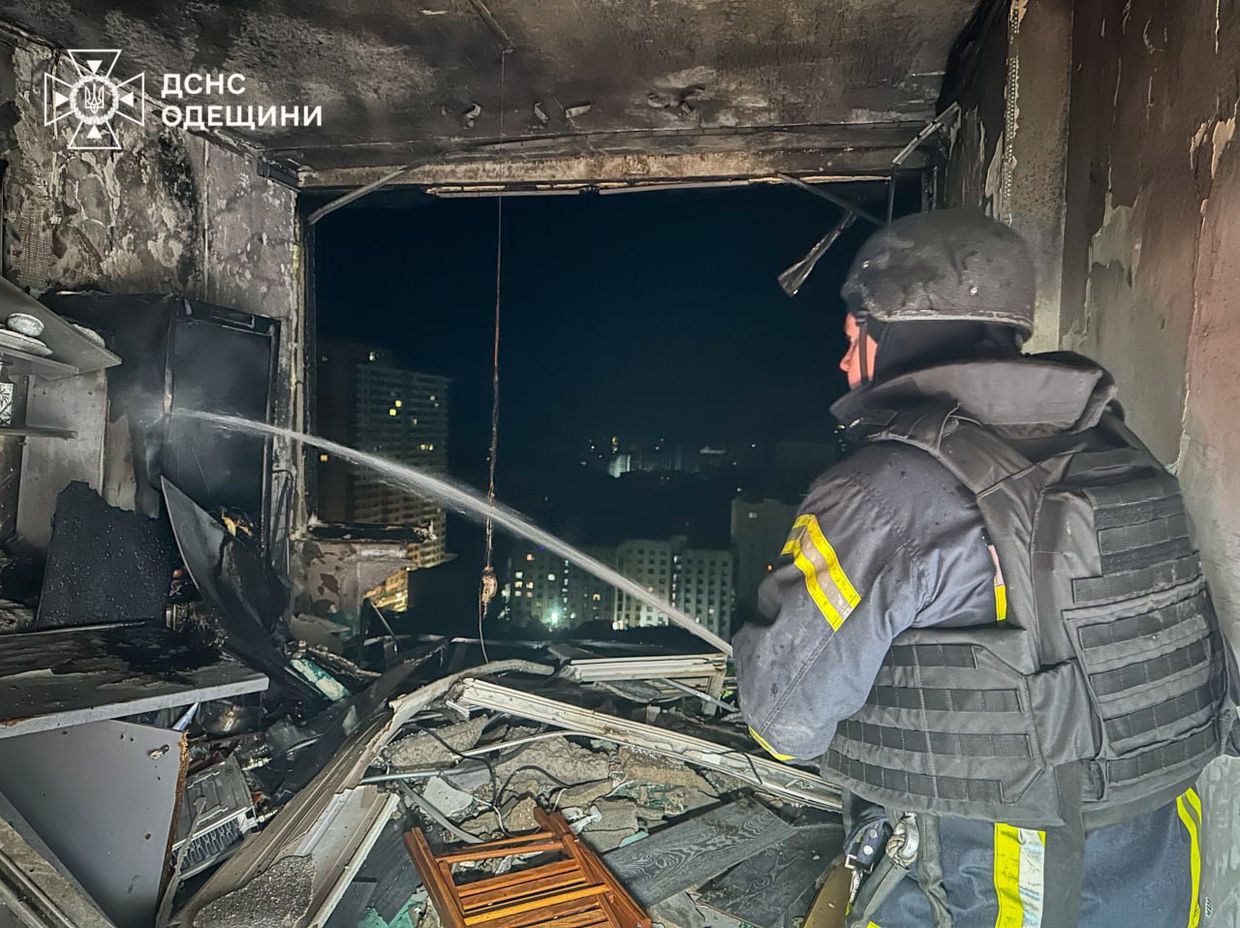 Firefighters extinguish a fire at a residential building in Odesa on June 20, 2025 following a Russian drone attack that injured at least 13 people, including three firefighters. (Ukraine State Emergency Service/Telegram)
Firefighters extinguish a fire at a residential building in Odesa on June 20, 2025 following a Russian drone attack that injured at least 13 people, including three firefighters. (Ukraine State Emergency Service/Telegram)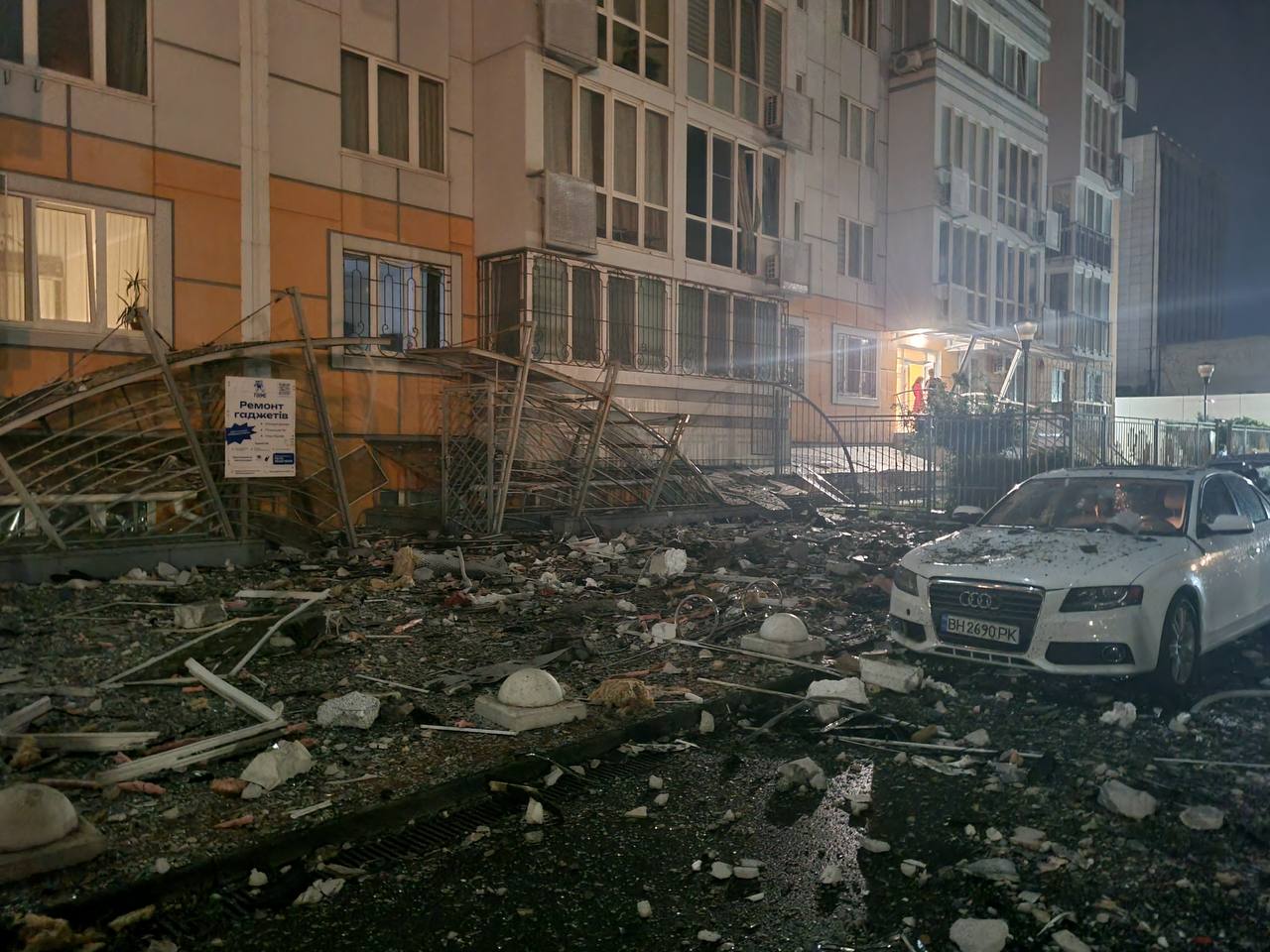 The aftermath of a Russian drone attack on a residential building in Odesa on June 20, 2025. The attacks on the city injured at least 13 people, including three firefighters. (Odesa Oblast Governor Oleh Kiper/Telegram)
The aftermath of a Russian drone attack on a residential building in Odesa on June 20, 2025. The attacks on the city injured at least 13 people, including three firefighters. (Odesa Oblast Governor Oleh Kiper/Telegram)